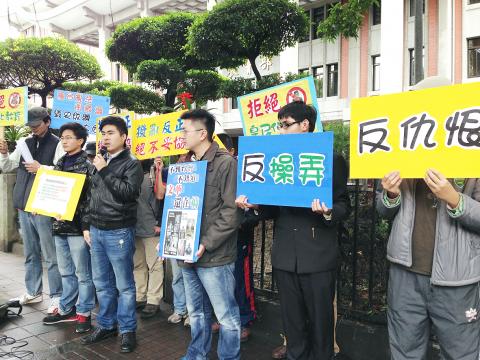The Anti-Independence-Oriented History Front asked the Ministry of Education to “toughen up” on its “minor adjustments” to the history curriculum and attributed the younger generation’s “mistaken understanding about the 228 Incident” to the former Democratic Progressive Party administration and pro-independent groups’ “distortion of history.”
“We are anti-manipulation, anti-hatred and want the truth,” the group shouted in front of the ministry yesterday, urging it not to cave in the face of “populist violence used by the pro-independence groups to blackmail the ministry,” or it would become the accomplice of the “history scam gang.”
The group said that the truth behind the 228 Incident has failed to be restored due to pro-independence groups’ obstruction, “as they treat it as a ‘political ATM,’” group convener Wang Ping-chung (王炳忠) said.

Photo: Lin Hsiao-yun, Taipei Times
He stressed that there is no need to demonize or deify Chiang Kai-shek (蔣介石).
“But it is wrong to say that Chiang was responsible for a massacre, when the truth is that he [was then in China] and received information via local officials, and never ordered a massacre or post-incident reckoning with ‘severe punishment,’” Wang said.
Lin Ming-cheng (林明正), a member of the group, likened recent protests against statues of Chiang with graffiti to the Chinese Red Guards’ behavior.
“These people are cowards who did not dare to do things like this when the Chinese Nationalist Party (KMT) was strong, but can only do so now as now the KMT is at its nadir,” Lin said.
The group also emphasized that the 228 Incident involved a group of local rioters attacking common people, including women and children, coming from China.
“According to historical documents, a great deal of weapons and ammunition were seized by local rioters. How could the government then have crushed ‘innocent people without weapons?’” said Wu Chih-chang (武之璋), a “historian who has studied the incident for years,” as introduced by the group.
Saying that much of the 228 Incident was “self-deserved,” Wu added that if those who rose up were calling for political reform, “why were schools, factories and orphanages attacked?”
“If we are to talk about transitional justice, where is the justice for those [Chinese] who were attacked for nothing?” he added.
On the number of victims, Wu said that it is “fraudulent to claim that more than 20,000 died in the incident, as many 228 museums do.”
“The most accurate number can be figured out by counting how many have applied for government compensation, which is about 600. Adding to that number the more than 100 that have gone missing would give us about 800,” Wu said.
“[The 228 Incident] is actually an insignificant matter in history, but has been manipulated and transformed by the scam gang into a major massacre in the nation’s history,” Wu said. “This has downgraded Taiwan’s civilization and academic level.”

A strong continental cold air mass is to bring pollutants to Taiwan from tomorrow, the Ministry of Environment said today, as it issued an “orange” air quality alert for most of the country. All of Taiwan except for Hualien and Taitung counties is to be under an “orange” air quality alert tomorrow, indicating air quality that is unhealthy for sensitive groups. In China, areas from Shandong to Shanghai have been enveloped in haze since Saturday, the ministry said in a news release. Yesterday, hourly concentrations of PM2.5 in these areas ranged from 65 to 160 micrograms per cubic meter (mg/m³), and pollutants were

Taiwan’s armed forces have established response protocols for a wide range of sudden contingencies, including the “Wan Chun Plan” to protect the head of state, the Ministry of Defense (MND) said today. After US President Donald Trump on Saturday launched a series of airstrikes in Venezuela and kidnapped Venezuelan President Nicolas Maduro, concerns have been raised as to whether China would launch a similar “decapitation strike” on Taiwan. The armed forces regularly coordinate with relevant agencies and practice drills to ensure preparedness for a wide range of scenarios, Vice Minister of National Defense Hsu Szu-chien (徐斯儉) told reporters before a

EVA Airways on Saturday said that it had suspended a pilot and opened an investigation after he allegedly lost his temper and punched the first officer several times as their plane was taxiing before takeoff at Los Angeles International Airport. According to a report published on Thursday by The Reporter, the incident occurred after the flight’s Malaysian first officer tried to warn the Taiwanese pilot, surnamed Wen (文), that he was taxiing faster than the speed limit of 30 knots (55.6kph). After alerting the pilot several times without response, the first officer manually applied the brakes in accordance with standard operating

The New Taipei City Social Welfare Department on Thursday celebrated Paralympic competitor Chen Tzu-wei (張孜維), who received last year’s national Golden Eagle award for exemplary achievement by Taiwanese with disabilities. Chen, who suffers from childhood-onset muscular dystrophy, did not attend the first award ceremony held by the Ministry of Health and Welfare in November due to illness. Chen was formally presented with the award at the department, where he gave thanks to government workers for supporting his education and livelihood, the department said in a statement. Chen was raised by the Ai-hsin Home for Persons with Disabilities in the city’s Bali District (八里)